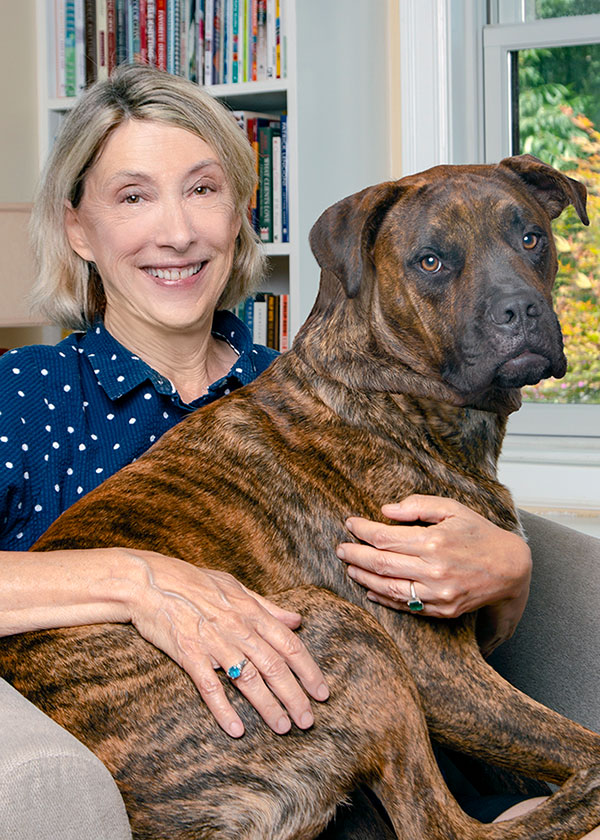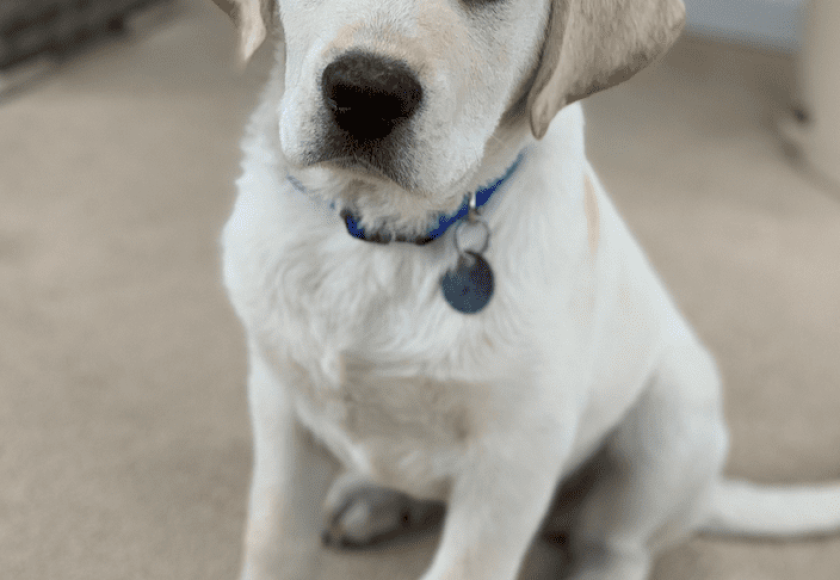Raising a well-behaved dog starts with clear rules and consistent training—just like raising a child. For service dog puppies, this foundation is even more critical. These future working dogs must learn impeccable manners and essential skills to one day assist someone in need. At Putnam Service Dogs, we equip our volunteers with the tools and guidance they need to raise outstanding service dog candidates. If you’re considering becoming a puppy raiser, here’s what you need to know to set your pup up for success.
The Importance of House Rules for Dogs
Dogs thrive on structure, making clear and consistent house rules essential—especially for future service dogs. Every member of the household should play a role in enforcing these rules, ensuring that expectations remain the same across the board. Consistency is key; if a pup is allowed in an area of the house one day but scolded for it the next, they’ll struggle to understand what’s expected. By setting and maintaining firm boundaries, limitations, and reward systems from the start, puppy raisers help their dogs learn faster and more reliably, setting them up for a lifetime of successful service.
What It Takes to Raise a Well-Mannered Dog
To raise a well-mannered dog as a service dog, it is essential to first manage the dog’s environment. Similarly to childproofing a home, puppy-proofing is an important first step that provides the puppy with a suitable environment for learning. Keep potentially dangerous objects that puppies can chew out of reach, ensure the dog has access to clean water and chew toys, and provide only safe toys, chews, and treats. Clear your counters of everything, if possible, but certainly any food, and put your kitchen trash away, or cover the can. It’s the human’s job to manage the pup so bad habits aren’t formed (counter surfing or foraging in the kitchen trash). It is always easier to prevent a bad habit from forming, than to undo it once the pup has the bad habit.
Before getting started, remember that the goal is to proactively teach and reward good habits while preventing or redirecting the pup away from bad habits using distractions, or if necessary, a firm “no.” All household members should review the following four essential house rules for dogs and commit to upholding them.
4 Essential House Rules for Our Service Dogs
Because our volunteer puppy raisers have the incredibly important role of raising potential service dogs, Putnam Service Dogs has four primary house rules for dogs we ask everyone to follow.
1. Paws on the Floor
Pups should not be allowed on any furniture, and they should not put their paws on counters, doors, or furniture. This “four on the floor” rule can be managed by using crates, leashes, and gates, and you can remove food from countertops to limit temptation. When the pup has all four paws on the floor, or when the pup chooses to enter his or her bed or crate, an emphatic “Good boy!” and treats serve as positive reinforcement.
2. Polite Greetings
Another house rule for dogs has to do with preventing them from jumping up on people when they are greeted. Using the pup’s leash, keeping the pup behind a gate, or tethering the pup to prevent this behavior are all excellent ways to manage this behavior. Furthermore, encouraging the pup to sit when he or she wants something throughout the day can mitigate jumping on people. If the person immediately turns their back to the pup when the pup jumps on them, this removes the pup’s chance to get closer to the person’s face/ get the person’s attention. The pup learns their jumping behavior isn’t working, without the human saying anything. Again, be sure to proactively reward the desired behavior.
3. Manners Around Food
Well-mannered dogs must be able to sit or settle calmly while the household is enjoying a meal. The pups also need to learn how to visit restaurants and grocery stores calmly, without sniffing great odors, cleaning the floor, etc. Service dog pups must learn to keep calm when food is available. Keeping the dog away from the dinner table during meals is ideal, and using a crate, tether, or gate is an excellent way to start building this habit.
4. Preventing the Stealing or Chewing of Items
All puppies need to chew, and this is especially true for potential service dogs as it teaches them how to put things in their mouth as retrievers. Providing appropriate chew toys at all times – even when the pup is in the crate – and rewarding the pup for actively choosing the designated toy can help build this habit. Further, if the pup does steal or chew an object that he or she shouldn’t, gently present the dog with his or her toy and remove the object. Avoid leaving socks, shoes, slippers, etc laying around, available to the pup. Prevention is so much easier than undoing bad habits once formed.
Using Praise to Reinforce House Rules for Dogs
Praise is one of the most effective tools for reinforcing house rules and encouraging good behavior. Puppies will inevitably test boundaries as they learn, but punishment—whether physical or verbal—can damage their trust and hinder progress. At Putnam Service Dogs, we’re committed to humane treatment of our service dogs and teach our volunteers and recipients how to engage our pups and service dogs with positive reinforcement. Teach your pup the value of hearing “Good Boy/Girl” by saying it, and giving them a treat. Then say it again, and give them a treat (10 times or so) so they learn when they hear praise, it means a good thing for them.
So what do you do when a pup pup misbehaves? Calmly redirect them with a firm “no” and immediately offer an acceptable alternative. Just as important, actively seek out moments of good behavior to praise—aiming for at least 20 instances per day. This consistent reinforcement helps puppies quickly grasp expectations and builds a strong, trusting bond between you and your future service dog.
Raise a Well-Mannered Dog with Putnam Service Dogs
If you and your household can commit to these four essential rules and meet Putnam Service Dogs’ qualifications, we encourage you to become a volunteer puppy raiser. The demand for service dogs continues to grow, and each well-trained pup brings life-changing support to someone in need. By opening your home and heart, you can play a vital role in preparing a future service dog for success.
Not able to raise a pup? You can still make a meaningful impact! A one-time or monthly donation helps us continue our mission, providing trained service dogs to individuals with disabilities (other than blindness) and veterans. Every contribution—big or small—helps transform lives.






